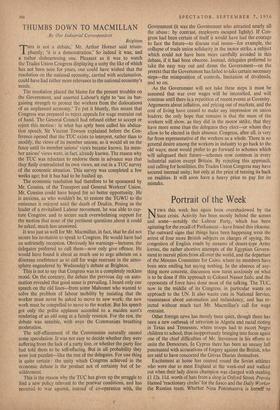By Our Industrial Correspondent Brighton r-r HIS is not a
debate,' Mr. Arthur Horner said trium- i, phantly; 'it is a demonstration.' So indeed it was; and a rather disheartening one. Pleasant as it was to watch the Trades Union Congress displaying a unity the like of which has not been seen for years, one could have wished that the resolution on the national economy, carried with acclamation, could have had rather more relevance to the national economy's needs.
The resolution placed the blame for the present troubles on the Government, and asserted Labour's right to 'use its bar- gaining strength to protect the workers from the dislocations of an unplanned economy.' To put it bluntly, this meant that Congress was prepared to reject appeals for wage restraint out of hand. The General Council had refused either to accept or reject this motion : in what has aptly been called his abdica- tion speech, Sir. Vincent Tewson explained before the Con- ference opened that the TUC exists to interpret, rather than to modify, the views of its member unions; so it would sit on the fence until its member unions' views became known. Its mem- ber unions' views were, in fact, already known. The reason why the TUC was reluctant to endorse them in advance was that they flatly contradicted its own views, set out in a TUC survey of the economic situation. This survey was completed a few weeks ago; but it has had to be hushed up.
The economic resolution had therefore to be sponsored by Mr. Cousins, of the Transport and General Workers' Union. Mr. Cousins could have hoped for no better opportunity. He is anxious, as who wouldn't be, to restore the TGWU to the eminence it enjoyed until the death of Deakin. Posing as the leader of a revitalised Labour movement, he was able to cap- ture Congress, and to secure such overwhelming support for the motion that none of the pertinent questions about it could be asked, much less answered.
It was just as well for Mr. Macmillan, in fact, that he did not secure his invitation to speak to Congress. He would have had an unfriendly reception. Obviously his warnings—lectures, the delegates preferred to call them—now only give offence. He would have found it about as much use to urge atheism on a diocesan conference as to call for wage .restraint in the atmo- sphere engendered by Wednesday's debate at Brighton.
This is not to say that Congress was in a completely reckless Government (it was the Government who attracted nearly all the abuse : by contrast, employers escaped lightly). If Con- gress had been certain of itself it would have had the courage to face the future—to discuss real issues—for example, the collapse of trade union solidarity in the motor strike, a subject which could not have been more carefully avoided in this debate, if it had been obscene. Instead, delegates preferred to take the easy way out and damn the GOvernment—on the pretext that the Government has failed to take certain necessary steps—the reimposition of controls, limitation of dividends, and so on.
As the Government will not take these steps it must be assumed that war over wages will be intensified, and will continue until there is a repetition of recent events at Coventry. Arguments about inflation, and pricing out of markets, and the cost of living have ceased to make any impression on union leaders; the only hope that remains is that the mass of the workers will show. as they did in the motor strike, that they have more sense than the delegates they elect—or whom they allow to be elected in their absence. Congress, after all, is very far from representative of the workers as a whole. There is no general desire among the workers in industry to go back to the old ways; most would prefer to go forward to schemes which will safeguard their future—schemes now common in every industrial nation except Britain. By rejecting this approach, and calling for hostilities, the Trades Union Congress may have secured internal unity; but only at the price of turning its back on realities. It will soon have a heavy price to pay for its mistake.


































 Previous page
Previous page